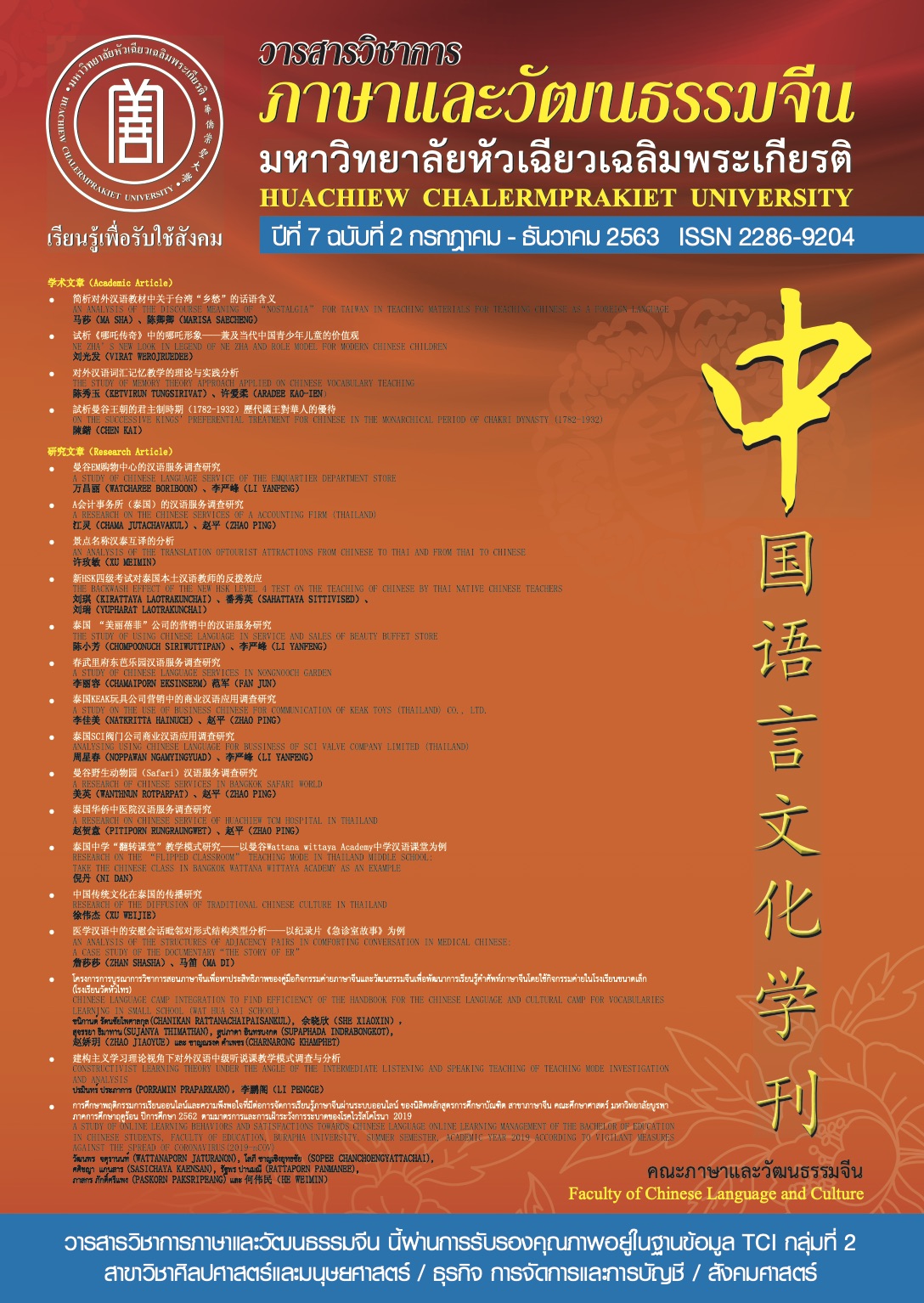A STUDY OF ONLINE LEARNING BEHAVIORS AND SATISFACTIONS TOWARDS CHINESE LANGUAGE ONLINE LEARNING MANAGEMENT OF THE BACHELOR OF EDUCATION IN CHINESE STUDENTS, FACULTY OF EDUCATION, BURAPHA UNIVERSITY, SUMMER SEMESTER, ACADEMIC YEAR 2019 ACCORDING TO VIGILANT MEASURES AGAINST THE SPREAD OF CORONAVIRUS (2019-nCOV)
Keywords:
Online Learning Behavior, Online Learning Satisfaction, Chinese Language Learning Management OnlineAbstract
This research aimed to study behavior, satisfaction, and problems and obstacles of the students of the Bachelor of Education in Chinese, Faculty of Education, Burapha University towards Chinese Language online learning management, summer semester, academic year 2019 according to vigilant measures against the spread of coronavirus (2019-nCOV). The sample used in this research was 28 students of the Chinese language program; 11 key informants (3 instructor and 8 students) for the in-depth interview which were selected purposively. The research instruments included 1) the online learning behavior questionnaire and satisfaction and 2) the interview questionnaire on online learning behavior, satisfaction, and problems and obstacles to Chinese language online learning management.
The research findings were as follows:
1) Online learning behavior of students of the Bachelor of Education in Chinese, Faculty of Education, Burapha University towards Chinese Language online learning management, summer semester, academic year 2019 according to vigilant measures against the spread of coronavirus (2019-nCOV) was found that 100 percent used smartphones to learn Chinese online and the readiness at a very high level. Their learning behavior according to class schedule via Google Meet are at a high level.
2) The students were satisfied with learning Chinese online according to vigilant measures against the spread of coronavirus (2019-nCOV) in general at a high level ( =3.86, S.D. = 0.77).
3) Problems and obstacles of students were the internet, learning environment, and time for submitting assignments or exam papers.
References
กระทรวงการอุดมศึกษา วิทยาศาสตร์ วิจัยและนวัตกรรม. (2563, 17 มีนาคม). ประกาศกระทรวงการอุดมศึกษา วิทยาศาสตร์ วิจัยและนวัตกรรม เรื่อง มาตรการและการเฝ้าระวังการระบาดของโรคไวรัสโคโรนา 2019 หรือโรคโควิด-19 (Coronavirus Disease 2019 (COVID-19)) (ฉบับที่ 3) : การปฏิบัติการของสถาบันอุดมศึกษาเพื่อป้องกันการแพร่ระบาดของโรคโควิด-19.
เกตุม สระบุรินทร์ , ศราวุฒิ แย้มดี และ ณัฏฐวัฒน์ ไชยโพธิ์. (2559). ทัศนคติและพฤติกรรมของนักเรียนต่อการใช้บทเรียนออนไลน์ด้วยโปรแกรม Moodle กรณีศึกษาโรงเรียนมัธยมศึกษาแห่งหนึ่งในกรุงเทพมหานคร. การประชุมวิชาการเสนอผลงานวิจัยระดับชาติและนานาชาติ ครั้งที่ 7 “Speed up Research towards World Class University. บัณฑิตวิทยาลัย มหาวิทยาลัยราชภัฏสวนสุนันทา.
ชวลิต ชูกำแพง. (2551). การประเมินการเรียนรู้. พิมพ์ครั้งที่ 2. มหาสารคาม: สำนักพิมพ์มหาวิทยาลัมหาสารคาม.
ธูปทอง กว้างสวาสดิ์. (2557). การสอนภาษาอังกฤษด้วยเทคโนโลยี. กรุงเทพมหานคร : โรงพิมพ์แห่งจุฬาลงกรณ์มหาวิทยาลัย
พัชรา คงเหมาะ. (2559). แนวทางในการพัฒนาห้องเรียนออนไลน์สำหรับอาจารย์ มหาวิทยาลัยเทคโนโลยีราชมงคลธัญบุรี. มหาวิทยาลัยเทคโนโลยีราชมงคลธัญบุรี. (รายงานวิจัย).
รุ่งกานต์ กันทะหงษ์. (2550). อุปสสรรคการนำระบบ E-learning มาใช้ในการเรียนการสอนของคณะวิศวกรรมศาสตร์ มหาวิทยาลัยเชียงใหม่. มหาวิทยาลัยเชียงใหม่. (รายงานวิจัย).
สราวุธ จำปาเรือง และ สุรีมาศ มั่งมูล. (2555). พฤติกรรมการเรียนรู้ผ่านบทเรียนออนไลน์ของนักศึกษาสาขานิเทศศาสตร์ มหาวิทยาลัยราชภัฏอุดรธานี.
ศูนย์การเรียนรู้ G Suite. (2020). ข้อมูลสรุปของ Google Meet. [Online] Available: https://support.google.com/a/users/answer/9300131?hl=th (15 June 2020)
มหาวิทยาลัยบูรพา. (2563, 16 มีนาคม). ประกาศมหาวิทยาลัยบูรพาที่ 0322/2563 เรื่อง มาตรการและแนวปฏิบัติการเฝ้าระวังการระบาดของโรคติดเชื้อไวรัสโคโรนา 2019 (COVID-19) ฉบับที่ 4 (การจัดการสอบปลายภคและการจัดการเรียนการสอนภาคฤดูร้อน).
Dumford, A.D., Miller, A.L. (2018). Online learning in higher education: exploring advantages and disadvantages for engagement. Journal of Computing in Higher Education. 30, 452–465 [Online] Available : https://doi.org/10.1007/s12528-018-9179-z (21 July 2020)
Jiří Zounek. (2013). Heads in the Cloud: Pros and Cons of Online Learning. Conference: INTERNATIONAL CONFERENCE DisCo 2013: New technologies and media literacy education. [Online] Available : https://www.researchgate.net/
publication/311807840_Heads_in_the_Cloud_Pros_and_Cons_of_Online_Learning (20 July 2020)
Skilllane. (2020). การศึกษาออนไลน์ผ่าน mobile device ได้ผลหรือไม่?. [Online] Available: https://www.skilllane.com/blog/effectiveness-of-online-learning-via-mobile-devices (20 July 2020)
Stefan Hrastinski, (2008). A study of asynchronous and synchronous e-learning methods discovered that each supports different purposes. EDUCAUSE QUARTERLY Number 4 2008.
TESOL. (2008). TESOL Technology standards framework. Alexandria, VA: Teachers of English to Speakers of Other Language, Inc.
Yousuf, M.. (2007). Effectiveness of mobile learning in distance education. The Turkish Online Journal of Distance Education. 8(4).
Downloads
Published
How to Cite
Issue
Section
License
บทความที่ได้รับการตีพิมพ์เป็นลิขสิทธิ์ของวารสารภาษาและวัฒนธรรมจีน มหาวิทยาลัยหัวเฉียวเฉลิมพระเกียรติ
บทความใน “วารสารวิชาการภาษาและวัฒนธรรมจีน” เป็นทรรศนะของผู้เขียนโดยเฉพาะ กองบรรณาธิการไม่มีส่วนในความคิดเห็นในข้อเขียนเหล่านั้น




